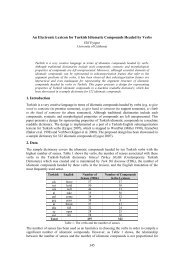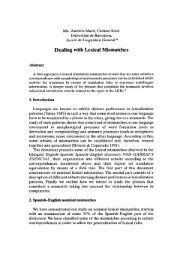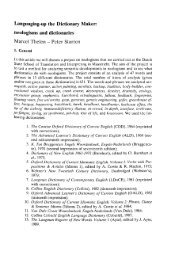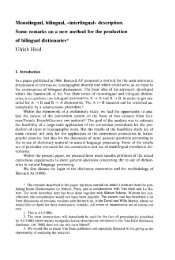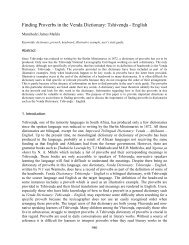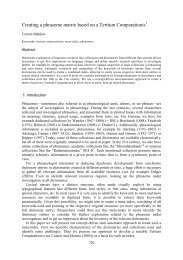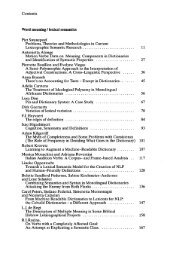Collocations in a New Bilingual Print and Electronic English - Euralex
Collocations in a New Bilingual Print and Electronic English - Euralex
Collocations in a New Bilingual Print and Electronic English - Euralex
Create successful ePaper yourself
Turn your PDF publications into a flip-book with our unique Google optimized e-Paper software.
EURALEX 2002 PROCEEDINGS<br />
qualification is apparent throughout the criteria for <strong>in</strong>clud<strong>in</strong>g collocations <strong>in</strong> PGE, with few<br />
exceptions which are noted later on <strong>in</strong> the paper.<br />
An additional factor that dist<strong>in</strong>guishes a collocation from a free comb<strong>in</strong>ation concerns lexical<br />
function, which Gi<strong>in</strong>thner <strong>and</strong> Blanco describe <strong>in</strong> detail [2002]. A free comb<strong>in</strong>ation can be<br />
expressed as a simple predication as <strong>in</strong> example 3:<br />
3. complete set ^ set(complete), a set which has the quality ofbe<strong>in</strong>g complete.<br />
4. complete fool ^ *fool(complete) a fool who has the quality ofbe<strong>in</strong>g complete ??.<br />
The collocation <strong>in</strong> example 4 is obviously different from the free comb<strong>in</strong>ation <strong>in</strong> example 3,<br />
<strong>in</strong> that "complete," rather than hav<strong>in</strong>g an explicit mean<strong>in</strong>g, serves as an <strong>in</strong>tensifier which can<br />
be expressed by the lexical function, <strong>in</strong>tensity [Mel'cuk 1995] 1V , which can be noted as<br />
follows: <strong>in</strong>tensity(fool) => complete - when the lexical function, <strong>in</strong>tensity, is applied to<br />
"fool" the collocation, completefool, results\ Because the lexical function <strong>and</strong> not the<br />
<strong>in</strong>dividual components of the collocation must be translated, the foreign language speaker<br />
requires a full translation of the collocation <strong>in</strong> the bil<strong>in</strong>gual dictionary. Here are several<br />
similar examples:<br />
complete ... adj... ~ fool Vollidiot;<br />
absolute ... adj... to talk ~ nonsense kompletten Uns<strong>in</strong>n reden;<br />
utter ... adj... an ~ waste of time e<strong>in</strong>e totale Zeitverschwendung;<br />
Though, as mentioned above, relevance to the L2 speaker supercedes the systematic list<strong>in</strong>g<br />
of lexical functions or collocations, these are often difficult for learners. Lexical functions<br />
appear to be especially notable <strong>in</strong> adverb collocations, which seem to have a very fixed,<br />
strongly pre-fabricated quality to them, or <strong>in</strong> Benson's words, they "spr<strong>in</strong>g readily to m<strong>in</strong>d"<br />
[Benson et al 1986]. They are often quite restricted, although semi-transparent.<br />
conveniently ... adv... ~ located günstig gelegen;<br />
completely ... adv... ~ certa<strong>in</strong> absolut sicher;<br />
commercially ... adv... ~ available im H<strong>and</strong>el erhältlich;<br />
accutely ... adv... to be ~ aware ofsth sich dat e<strong>in</strong>er S. gen sehr bewusst se<strong>in</strong>;<br />
adamantly ... adv... to be ~ opposed to sth etw entscheidend ablehnen;<br />
carefully ... adv ...to listen~aufmerksam zuhören;<br />
<strong>Collocations</strong>, Compounds <strong>and</strong> Idioms<br />
On the other h<strong>and</strong>, as multi-word expressions, collocations are not as fixed as idioms or<br />
compounds, which can be considered "lexically atomic" units [Günthner & Blanco 2002].<br />
These are not analysable on any level nor can they be readily modified, as several examples<br />
from Günthner <strong>and</strong> Blanco [2002] show. In example 5 below, both the collocation <strong>and</strong> the<br />
free comb<strong>in</strong>ation can be modified, whereas the compound cannot.<br />
798



